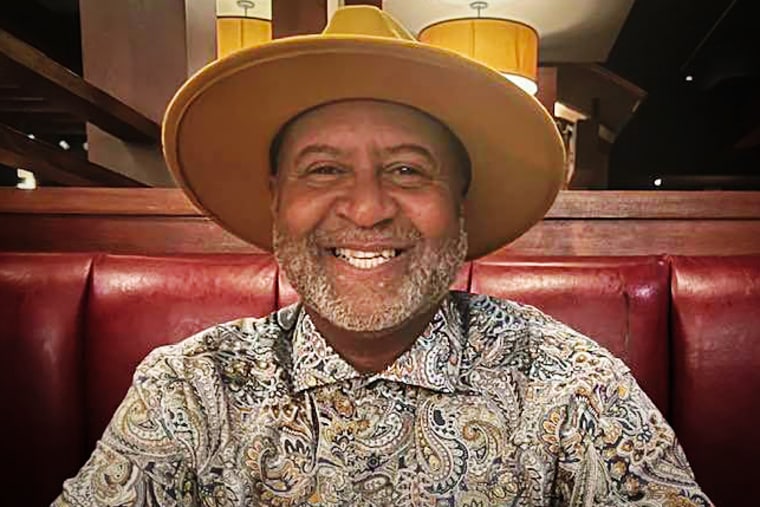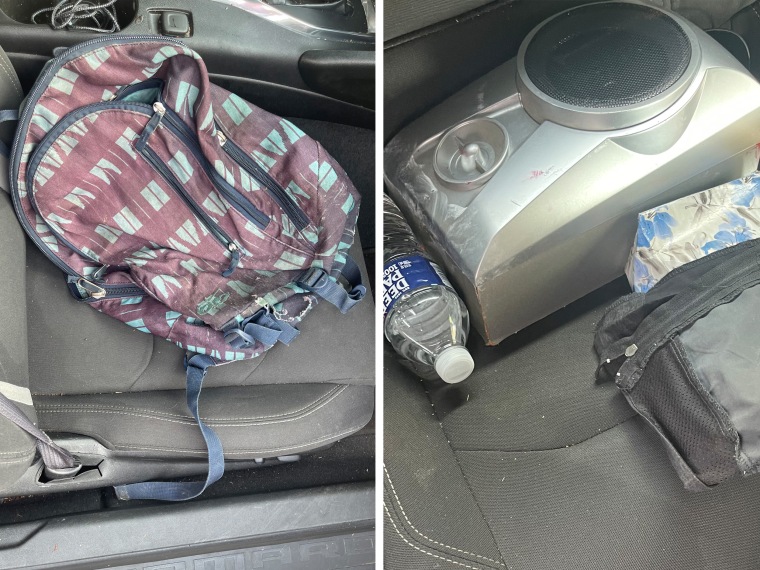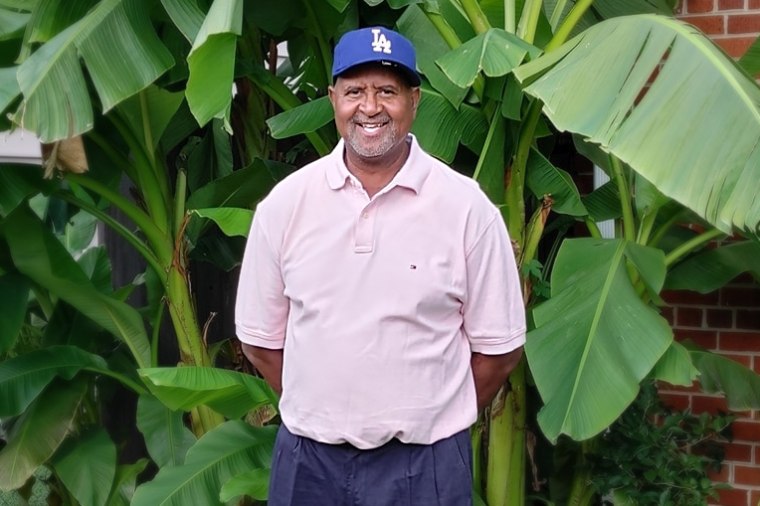A gay Black man was pronounced dead in late May shortly after he was found in the middle of a street in Washington, D.C., without his phone, his wallet or any jewelry. His car was missing, too.
Police say there’s “no evidence of foul play.” But the man’s longtime partner said he believes otherwise and is searching for answers, as was first reported by the LGBTQ newspaper the Washington Blade.
Ernest Terrell Newkirk, 55, died three hours after having told his partner, Roger Turpin, that he was heading home from a nearby bar. His body was found a mile away from the couple’s Washington home and not on a direct route from the bar.
After Newkirk was pronounced dead, outgoing calls were made from his cellphone, traffic tickets were issued to his car, and someone used his debit card to buy gas and tried to use it at an ATM, according to documentation Turpin received from Newkirk’s phone company and bank, along with the Washington Department of Motor Vehicles. And when Turpin was eventually reunited with Newkirk’s missing 2017 Camaro convertible, he said, there were items in the vehicle that did not belong to the couple.
Turpin said that he repeatedly offered to provide the documentation to the police from late May through the first week of August but that they either explicitly declined or ignored his verbal offers. Now, more than two months after Newkirk’s death, Turpin remains frustrated with the investigation and worried that Washington authorities are not “taking the case seriously,” he said.

In an email Monday, a spokesperson for Washington’s Metropolitan Police Department said the investigation continues.
“At this time, Mr. Newkirk’s death does not appear to be a result of foul play. There are no signs of trauma. We are awaiting the [medical examiner] to provide a cause and manner of death,” said the spokesperson, Hannah Glasgow.
The cause and manner of death will be determined after the toxicology report is completed, which, according to the medical examiner’s office, could take up to 90 days after an autopsy.
Glasgow rebutted Turpin’s assertion that police had declined or ignored his offer of documentation, saying the “initial detective assigned to this case has no record of any offers for additional documents.” And asked about Turpin’s statement that authorities were not “taking the cause seriously,” Glasgow said that the police department “approaches all cases with a profound sense of responsibility” and that “each investigation is given the utmost attention and dedication.”
Turpin, however, fears that if investigators wait any longer, it will be too late to bring any potential bad actors to justice.
Two police experts found no glaring red flags in the case’s publicly known details and Rogers’ concerns about the investigation.
Joseph Giacalone, an adjunct professor at John Jay College of Criminal Justice in New York City who is a former New York Police Department cold case sergeant, cautioned that just because police aren’t telling Turpin and the media they’re looking into Newkirk’s phone records and other potential leads doesn’t mean they’re not.
“If there is a crime involved, the police department will rarely give out that kind of information, because they don’t want to spook the people who were responsible,” he said. “If they go on the run, it makes it more difficult for them to track them down.”
Giacalone also said a lack of “foul play” doesn’t necessarily mean there was no crime; he said it wouldn’t be unheard of for bad actors to loot the body of someone who died of natural causes.
And when it comes to putting an investigation on hold until a toxicology report is complete, Cloyd Steiger, a former Seattle police homicide detective, said the “hold for tox” approach isn’t uncommon, especially in a large city with a high murder rate and when there’s no clear sign of foul play.
A 'social butterfly' and 'law-abiding citizen'
Newkirk, a native of North Carolina, moved to Washington in the early 1990s. Turpin described him as a “social butterfly” and a “law-abiding citizen,” adding that Newkirk owned his own landscaping business and worked as a chef for the NBA’s Washington Wizards at Capital One Arena.
“He changed a lot of people’s lives,” Turpin said. “He gave a lot of people jobs at the arena he worked at. He would hire them, and he will mold them into making a career.”
Given his gregarious personality and his deep ties to the local LGBTQ community, Newkirk was looking forward to the annual DC Black Pride weekend, including an unofficial Pride gathering at the Ugly Mug bar on the evening of Saturday, May 27.
Shawn Thorpe, 56, who was friends with Newkirk for over two decades, told NBC News he saw Newkirk around midnight that night just outside the Ugly Mug, where some of the bar’s overflowing crowd had congregated. The two men talked for about 30 minutes, Thorpe said, adding that Newkirk seemed intoxicated.
At 12:30 a.m., Newkirk called Turpin to say he was on his way home, Turpin recalled. When he wasn’t home the next morning, Turpin started to panic. Unaware that Newkirk had already been pronounced dead and that his body had been labeled “John Doe” at the city morgue, Turpin started to look for his partner of two decades, searching nearby residential areas on foot and by car and reaching out to Newkirk’s friends to see whether they knew where he was.
At 10 p.m. Sunday, Turpin filed a missing person’s report. He said two officers came to his house, took down the report and asked for a photo of Newkirk, which Turpin provided.
Turpin would be left without answers for 36 more hours.
'Unconscious adult male in the street'
Police were notified shortly after 3 a.m. Sunday, May 28, about an “unconscious adult male in the street,” according to a Metropolitan Police Department report shared with NBC News. When officers arrived, the person who reported the incident was administering CPR, and the responding officer took over CPR until the ambulance arrived, the report says. “After all attempts at life saving measures,” the report says, the man, who had no identification on him, was pronounced dead.
The person who reported the incident, Kameron Rogers, 27, said he was driving his friend Asia home when they saw Newkirk facedown in the middle of the street. Rogers said he got out of the car, approached Newkirk and flipped him over to perform CPR and check for a pulse, which was “very faint” at the time. Rogers said that Newkirk’s body was cold and that he saw indentations on his face from the gravel, which led him to think Newkirk had been facedown on the street for some time.
When the first officer arrived, Rogers, who isn’t a medical professional, told the officer he thought Newkirk was dead, he said. Rogers and Asia, who remained in the car while her friend administered CPR, said the officer didn’t administer CPR, contradicting the police report, and didn’t check Newkirk for a pulse. Rogers alleged the officer said that “this happens all the time” about the body in the street.
Asked to respond to Rogers’ and Asia’s allegations, Glasgow, the police spokesperson, said “body-worn camera video confirms the responding officer performed CPR.” The police department, however, declined to provide that video to NBC News because the investigation is ongoing. As for the officer’s alleged remarks, Glasgow said the department was “unable to confirm this interaction.”
When the ambulance arrived, Rogers said, an emergency responder put a white sheet over Newkirk’s body. Asia, a nursing student who asked that her full name not be published because she feared police retribution, said the emergency responder didn’t appear to administer CPR or check for a pulse. Rogers said he couldn’t recall whether the worker took those measures. Citing health care privacy regulations, Daryl Levine, a spokesperson for the Washington Fire and Emergency Medical Services Department, wouldn’t comment on what, if any, lifesaving measures were used.
While Newkirk’s body was still lying in the street, Rogers was handcuffed and then detained and charged with unlawful carrying of a firearm in Washington. Rogers, who is licensed to carry a firearm in neighboring Virginia, said he put his handgun in his pocket when he got out of the car out of concern for his safety. His firearm case is still under investigation, he said.
A dreaded phone call
After two days frantically searching for his partner and any information about his whereabouts, Turpin got a call on the morning of Tuesday, May 30, from a homicide detective asking for a photo of Newkirk, he said.
Three hours later, the detective called back to tell him Newkirk was dead. The detective, Turpin recalled, said where and when Newkirk’s body had been found and said that the cause of death may have been a heart attack and that no foul play was suspected. He added that Newkirk couldn’t immediately be identified because he had neither a phone nor a wallet on him.
Turpin said the detective didn’t ask him any questions about Newkirk on the call, even after Turpin mentioned his partner’s missing car and the outgoing phone calls and bank transactions after his death. Turpin said he also told the detective that Newkirk’s missing car had OnStar, which includes GPS, in the hope that it could be used to find the vehicle.
“He would not take that information,” Turpin said, adding that the officer was “convinced” Newkirk had a heart attack and seemed uninterested in looking into the circumstances surrounding his death.
A search for answers
During the two days Turpin thought Newkirk was missing and after he was informed that Newkirk had died, Turpin uncovered several pieces of alarming information, he said.
When Turpin logged on to the couple’s joint T-Mobile account on May 28, he said, he discovered several outgoing calls from Newkirk’s cellphone to unfamiliar numbers from 6 a.m. to 8 a.m. that morning — hours after Newkirk had been pronounced dead. The same day, Turpin contacted Newkirk’s bank and learned that his debit card had been used several times during the same time frame. Less than a week later, Turpin said, he received five speeding tickets associated with Newkirk’s car, with the violations having taken place after his death. Turpin shared screenshots of the couple’s T-Mobile account and the Department of Motor Vehicles website corroborating those claims.
Around the same time, Turpin filed a stolen car report with the police department and then contacted OnStar, which eventually found the car and shared the location with police, he said. On Saturday, June 3, Turpin got a call from a police officer informing him that Newkirk’s car had been found in an apartment building parking lot a mile away from where his body had been found and that the car had been taken to an impound location.
Turpin wasn’t able to retrieve Newkirk’s Camaro from impound until July 23, after his late partner’s estate was transferred to him. When he peered into the car, he said, he immediately noticed a maroon and green backpack on the passenger’s seat and a gray speaker in the back, neither of which belonged to him or Newkirk. Turpin said investigators neither fingerprinted nor inspected the vehicle, so he has been trying to leave it exactly as it was when he picked it up from impound, hoping it will be more closely inspected at some point. He provided images of the backpack and the speaker, which still remain in the car, to NBC News.

In her email Monday, Glasgow said that Newkirk’s car was “processed by the Department of Forensic Science before being released to Mr. Turpin” and that the backpack and the speaker found in the vehicle have “no evidentiary value to the investigation.” Glasgow didn’t respond to a follow-up question asking her to elaborate on how the car was “processed” and specifically whether it was fingerprinted.
Turpin said that he tried to review security video from the Ugly Mug in late May but that a staffer told him he couldn’t have access. In an interview in late July, the bar’s manager, Gaynor Jablonski, said he had no previous knowledge of Newkirk’s death or Turpin’s request. He said that because of privacy reasons, the bar shares its security video only with police. Asked whether police had requested security video in connection with Newkirk’s death or for any reason during that time period, he said they hadn’t. And now, he said, it’s too late: The video from late May is long gone, having been overwritten by newer video.
In a follow-up conversation Tuesday, Jablonski said a detective called him to ask about video on Aug. 9, the day NBC News sent an email asking the department to confirm Jablonski’s statement that police never requested the video.
Turpin said that in the two months after Newkirk’s death, he repeatedly called the detective initially assigned to the case to offer to share information about the phone calls, traffic tickets, debit card transactions and Newkirk’s car but that the detective showed no interest in the findings. He also said he showed up at the police station multiple times during that time period, once with Newkirk’s mother, but was never able to talk to anyone about Newkirk’s case.
On July 24, in a text message viewed by NBC News, Turpin contacted the detective to inform him about the strange items in Newkirk’s car and ask that the vehicle be fingerprinted. The detective responded that he’s no longer on the case, because it’s not being investigated as a homicide, and shared the contact information for the new detective, Turpin said. From July 26 to July 28, Turpin left the new detective about seven voicemail messages and never got a response, he said.
Glasgow confirmed that Newkirk’s death isn’t being investigated as a homicide, saying, “No evidence has been recovered that would justify a homicide investigation.”
Turpin shared the several numbers that were called from Newkirk’s cell phone shortly after his death. NBC News called the numbers, and three of the calls resulted in conversations. None of the three people reached by phone knew Newkirk, but two of them had a mutual connection, and they said the connection — whom NBC News isn’t naming because of the investigation — may have called them on the morning of Sunday, May 28. The person’s last known address, according to public records, is on the block where Newkirk’s body was found.
The first detective assigned to the case never responded to requests for comment and attempts to share the information. Two other detectives declined to speak and referred NBC News to the police department’s public information office.
On Aug. 1, Turpin was informed that a third detective was taking over the case, and he had his first conversation with the detective on Aug. 9, he said. During their 40-minute meeting — the only in-person conversation he has had with a detective assigned to the case — she didn’t appear familiar with the case details, but she was the first to take down the information Turpin had spent the previous 10 weeks collecting, he said shortly after the meeting.
Turpin said that the conversation has left him a bit more hopeful but that he still fears that time is running out and that any potential evidence — like the security video from the Ugly Mug — could soon be gone.



